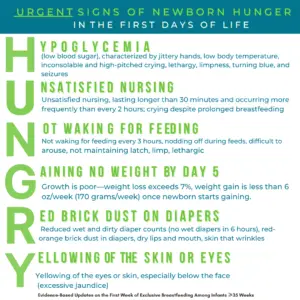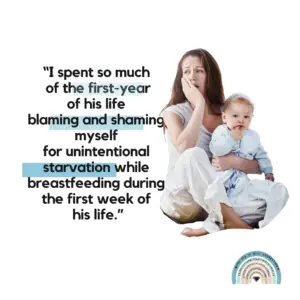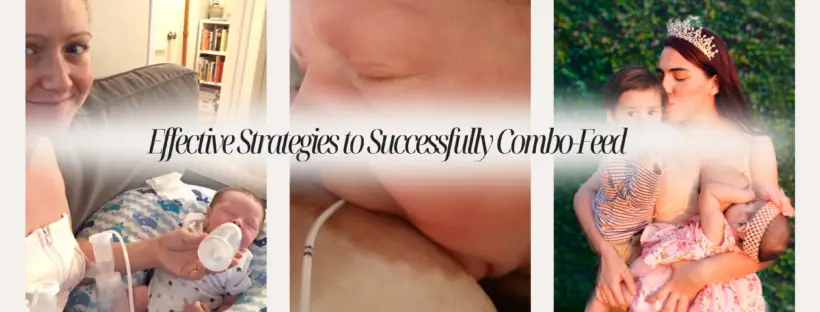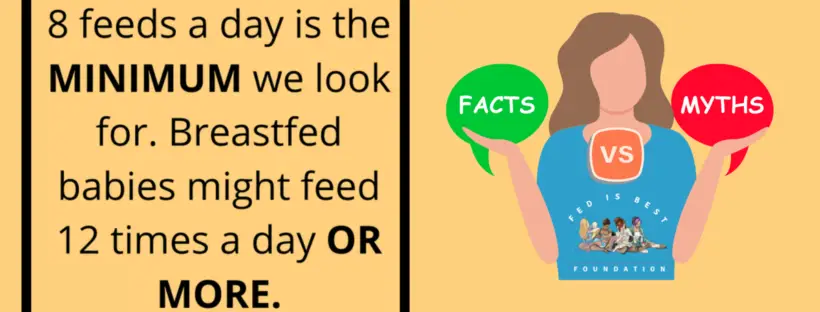Did you know combo-feeding is the most common way to feed babies worldwide? In the US, 75% of babies and 59% globally receive infant formula during the first year of life, yet it is often overlooked in new parents’ infant feeding education and support. Given these significant statistics, parents shouldn’t have to navigate alone or rely on friends, family, and social media for potentially inaccurate information that could compromise the health of infants or breastfeeding itself. Continue reading
Tag: #breastfeeding #Mentalhealth #Postpartumdepression
Nurse Takes Formula Away From Parents Who Were Trying to Feed Their Hungry Baby In The Hospital
My feeding journey was not at all what I envisioned for my little one and me. When I was pregnant with my firstborn, I heard stories from my mom that she never used a bottle with my brother and me. When I researched breastfeeding, parents were told how wonderful and natural it is. I believed breastfeeding would come naturally.
The day my son was born was a whirlwind. I had to have a c-section due to complications, but we were so excited to meet him. The first few days, I tried to get him to latch on, and he would stay for a little while and then unlatch. I felt uneasy that he wasn’t getting enough colostrum, but the medical staff told me I was doing great. My husband and I were so focused on getting breastfeeding down that I forgot to get pictures of me and my little one. My focus was getting him fed the right way. Sometimes, nursing hurt so much that I would dread it when it was time for feeding. The on-site lactation consultant came the day after the c-section. She was with me for an hour and told me everything was wonderful!
After she left, my baby would cry, and I knew something wasn’t right. My husband and I decided it was time to ask for formula. When we asked, the nurse kept asking us if we were sure. As first-time parents, we questioned if we were doing the right thing.

I was so exhausted and needed rest that my husband decided to feed my little one formula. Another nurse came in and said, “Dad! Don’t! Breastfeeding is the way! Don’t do that to your little one. Your wife is doing great.” She grabbed the formula from my husband’s hands and stashed it in a cabinet. My husband and I looked at each other in shock, and I tried to breastfeed again.
We were discharged on a Friday, and over the weekend, my son cried a lot, and I thought he might be a fussy baby. On Monday morning, we saw that my son had orange urine in his diaper. I lost it. I remember holding him and crying, blaming myself. We went to the doctor’s office and were told that he was dehydrated. He also lost a lot of weight, more than he should have, and my doctor suggested it was time to supplement my baby with formula.
Then came the day that changed my mental health forever.
After that, I cried for hours, and I could not get over the guilt. I kept thinking: “Why didn’t I know he was hungry or not getting enough? How could I have let my baby starve?” The guilt stayed with me for months and was the catalyst for my debilitating postpartum depression and anxiety diagnosis.

After that, I became obsessed with feeding my son. I would write down how many ounces of formula or breastmilk he had and at what times. I no longer breastfed, but I pumped, so I knew exactly how many ounces he was consuming. Even when he was a few months older, I would still wake him up to feed him because I thought he would become dehydrated again. I hated when my little one would cry because it would be a reminder of the terrible weekend of his life, and I would break down, and I would cry.
My husband and I hope to have another little one, and I know what I would do differently. I feel guilty that my little one had a rough start on his feeding journey, but I try to remember that we were both learning and following the advice of medical professionals in the hospital.
I can’t tell you how much I appreciate Fed is Best Foundation and their work. I honestly don’t know what would have happened to me without finding your support community. I got so emotional writing my story. Thank you for being there for mothers and babies.
Warmly,
Maria

FREE infant feeding resources:
Knowing if Your Newborn is HUNGRY and Needs Urgent Evaluation / Supplementation – Fed Is Best
Safe Infant Feeding Resources (fedisbest.org)
Fed is Best Feeding Plan – Updated 2024 – Fed Is Best
Pre-order our new book being published June 25th, 2024 : Fed Is Best Book – Fed Is Best Book
How to Breastfeed During the First 2 Weeks of Life – The New York Times (nytimes.com)
Contact Information – The Fed is Best Foundation
The Ten Steps to Ethical, Successful, And Inclusive Infant Feeding
In most hospitals and prenatal educational materials, exclusive breastfeeding (EBF) is the recommendation for infant feeding. EBF is promoted as the only healthy way to feed a baby, with partial breastfeeding, temporary supplementation, and formula feeding falsely characterized as “suboptimal.” Other infant feeding options, such as exclusive pumping or formula supplementation, are discouraged, even when requested by parents. But does this narrow definition of healthy infant feeding support patient rights and ethical infant feeding principles? No, it does not.
Infant feeding support in postpartum units should consider ethical principles of autonomy, beneficence, justice, and non-maleficence when considering the extent to which lactation should be promoted.
What Are The Principles of Ethical Infant Feeding?
Autonomy: The parents choose how they intend to feed their baby at each feeding, and maternal bodily autonomy is affirmed and respected.
Beneficence: The benefits of infant feeding types are provided to the parent to help them make an informed decision. Healthcare providers must not decide what is best for the parent.
Justice: Do not assume a feeding method. Ask the parent how they want to feed their baby. Affirmative consent must be obtained before touching a patient’s body.
Things We Wish We Knew About Breastfeeding Before We Started
Parents from the Fed is Best Infant Feeding Support group have told us that their prenatal education didn’t prepare them for the realities of breastfeeding and didn’t teach them the education they wanted and needed. They want other families to be informed to have a safe and positive breast/chestfeeding experience. This is what they said:
“It’s really, really difficult!”
Is Breastfeeding Twelve or More Times a Day Normal? Not Always
A meme posted by an IBCLC states that breastfeeding 12 or MORE times a day is “normal” with no further education on when it can be a sign of newborn hunger, poor feeding, inadequate milk transfer, or failure to thrive.

Overly simplistic memes like this are irresponsible and confusing and, in some cases, are why parents miss red flags that require medical attention and lactation assessment to be sure the baby is receiving adequate nutrition and fluids when nursing. (Source of meme to the left, Facebook, Lucy Ruddle, IBCLC)
Here at the Fed Is Best Foundation, we receive messages frequently from families who tell us they were repeatedly assured by trusted health professionals that nursing 12 or more times a day is completely normal.
But is it always normal?
No, it’s not. Continue reading




